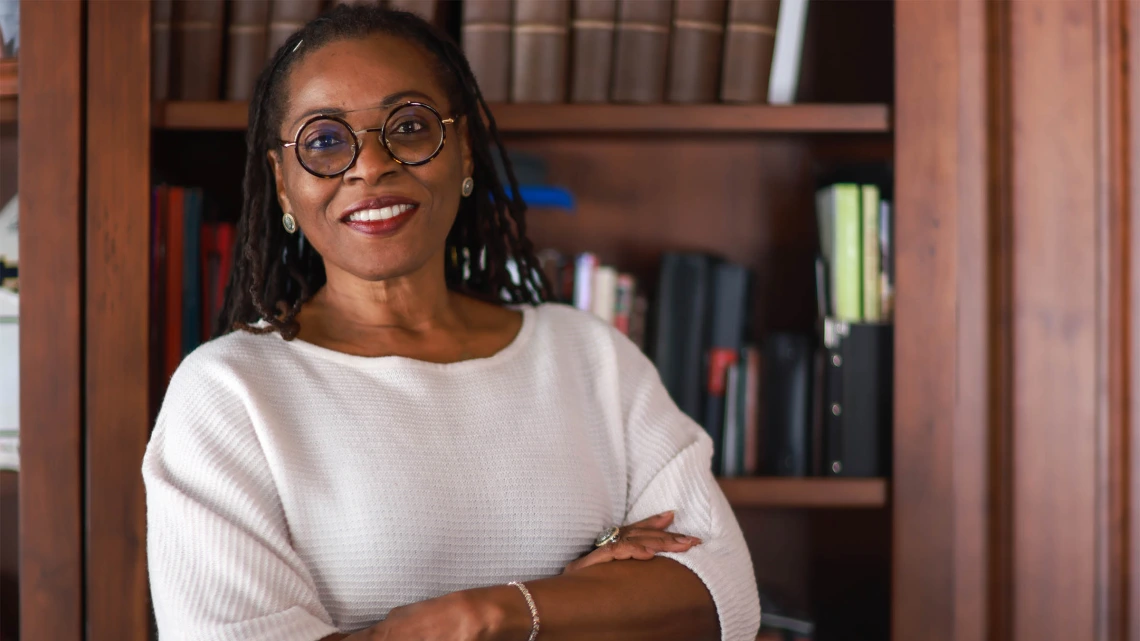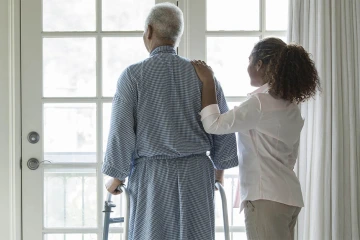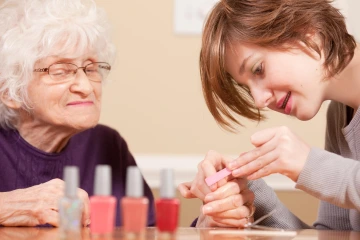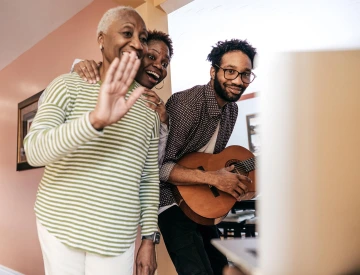Teaching Appreciation for Aging Through Personal Connections
Dr. Amanda Sokan finds contentment in helping students develop intergenerational partnerships and building their awareness of the aging experience.

Dr. Amanda Sokan specializes in gerontology, the study of the aging process.
The work Amanda Sokan, PhD, MHA, LLB, does in the Mel and Enid Zuckerman College of Public Health is a far cry from her earlier career as an executive officer in the solicitors department of the Metropolitan Police Service in London.

Bringing younger people into contact with older people is central to Dr. Amanda Sokan’s educational philosophy.
Her days are filled with thorny questions of rights and ethics, allowing her to apply her lawyer’s sense of justice to the lives of older people. This work includes nuts-and-bolts matters like balancing an older person’s need for autonomy with the need to determine competency, but also brings her into what she calls “darker areas,” such as elder mistreatment and end-of-life issues.
“Gerontology allowed me to bring the different jigsaw pieces of myself into this whole,” Dr. Sokan said. “I’m kind of all over the place with stuff, which means that I’m never an expert. Those people have a mountain that they climb and then they rule that mountain. I have all of these little molehills that I inhabit.”
In recognition of her outstanding contributions to the field, in 2020 Dr. Sokan was named Gerontologist of the Year by the Arizona Geriatric Society.
A career pivot
The path from a background in law to a career in gerontology wasn’t straightforward. Rather, it was the end result of a series of decisions set in motion by her employer’s generous leave policies, which inspired Dr. Sokan and her husband to seek adventure on the other side of the world.
“We lose so much as a society because we haven’t created spaces where older adults can interact with younger people.”Amanda Sokan, PhD, MHA, LLB, assistant professor, College of Public Health
“In England, we were still young and our kids were little,” Dr. Sokan said. “We thought we’d travel this side of the world and experience it for a bit, and then go back to England. And here we are! We never moved back.”
Seeking a career change, Dr. Sokan was drawn to health care. She earned a Master of Health Administration from the University of Kentucky, followed by an administrative fellowship on workplace planning and development. She then considered a doctorate in public health.
“I went to speak with a few of the faculty to look at the DrPH,” Dr. Sokan said. “While I was waiting, I saw a flyer that said, ‘Have you thought of gerontology?’ I was like, “Gerontology? What’s that?’ I read the flyer while I was waiting, and I was fascinated.”
She was pleased to discover that the concepts she learned in her gerontology classes were immediately applicable to her mother, who was an ocean away and being cared for mainly by Dr. Sokan’s sister.
“I could learn stuff in these courses and my sister could apply it,” Dr. Sokan said. “Law takes more for you to connect the dots between what you’re learning and how it impacts life. Same thing with health care administration, because you work within rules and laws. But with gerontology, you could take a bit of understanding and run with it, applying it to a real-life person.”
A ‘happy place’
Although Dr. Sokan keeps herself busy with multiple projects, including her work representing Arizona’s team on the CDC’s Healthy Brain Initiative and providing consultations for people with dementia and their caregivers, she cites teaching as among her most important duties. She calls the classroom her “happy place,” including the virtual classrooms she leads as an online instructor for the College of Public Health’s Phoenix campus.
“My students may not decide that they want to work with older adults, but they’ve gotten a different perspective of what it means to be old, and the value of old people to society,” she said. “My charge to myself is never to turn down an opportunity to plant some seeds, whether or not I get to come back to water them.”

Social interaction, including touch, is crucial at all ages.
Dr. Sokan believes interaction with older people is crucial for her students’ education, and throughout her teaching career she has found a variety of ways to keep students engaged with older adults, including visits to senior centers and arranging one-on-one interviews.
“At first, they say, ‘Ugh, this is going to be boring,’ or have the sense that they’re going to be knights in shiny armor redeeming these old people from their drab existence,” she said with a laugh. “Then they begin to see them as individuals, not just as an old person. I can talk until I’m blue in the face about aging, but it’s different when you spend time with an older adult — it’s the best way to trigger that understanding of older adults as our future selves.”
She describes one excursion to a senior center in Kentucky. Dr. Sokan envisioned it as an opportunity to focus on the importance of touch in human interaction. She asked her students to give manicures, pedicures and foot massages to the older residents. Using wipes, lotions and gloves, Dr. Sokan demonstrated for her students how to clean the residents’ feet and apply the lotions.
“Human beings are social animals. We want to be loved, we want to be touched,” she said. “All I wanted them to do was touch, because a lot of what’s missing is that interaction with someone. You can’t beat the conversation that’s possible when you’re cleaning somebody’s feet.”
An adaptation to changes
While the COVID-19 pandemic has hit the pause button on these types of face-to-face interactions, Dr. Sokan believes technology can facilitate similar connections in virtual spaces.
“Instead of meeting once or twice a month to have coffee or tea or play bingo, you could always do something online with Zoom,” she said. “You will be working with an older adult if it’s the last thing I do!”

Even after the pandemic, family and friends can still use technology to connect with older adults.
When she started arranging ways for her students to interact with older people, Dr. Sokan was surprised to learn about the challenges her emphasis on intergenerational contact could pose.
“One cannot assume that a younger person has access to an older person. I learned that the hard way,” she recalled. “Students will say to me, ‘I don’t know any old people. My grandparents live 10 states away.’ It had never occurred to me!”
She says these issues are simply reflections of the reality of life today, but also believes society would benefit from bringing older people back into the fold. Forging these connections is central to Dr. Sokan’s teaching philosophy.
“I see a difference between people who grew up in company of an older adult, who saw someone age as part of their lives, and people who didn’t. Their conception of what it means to be old and aging is from the media and movies. There isn’t that personal connection,” Dr. Sokan said. “We lose so much as a society because we haven’t created spaces where older adults can interact with younger people.”

